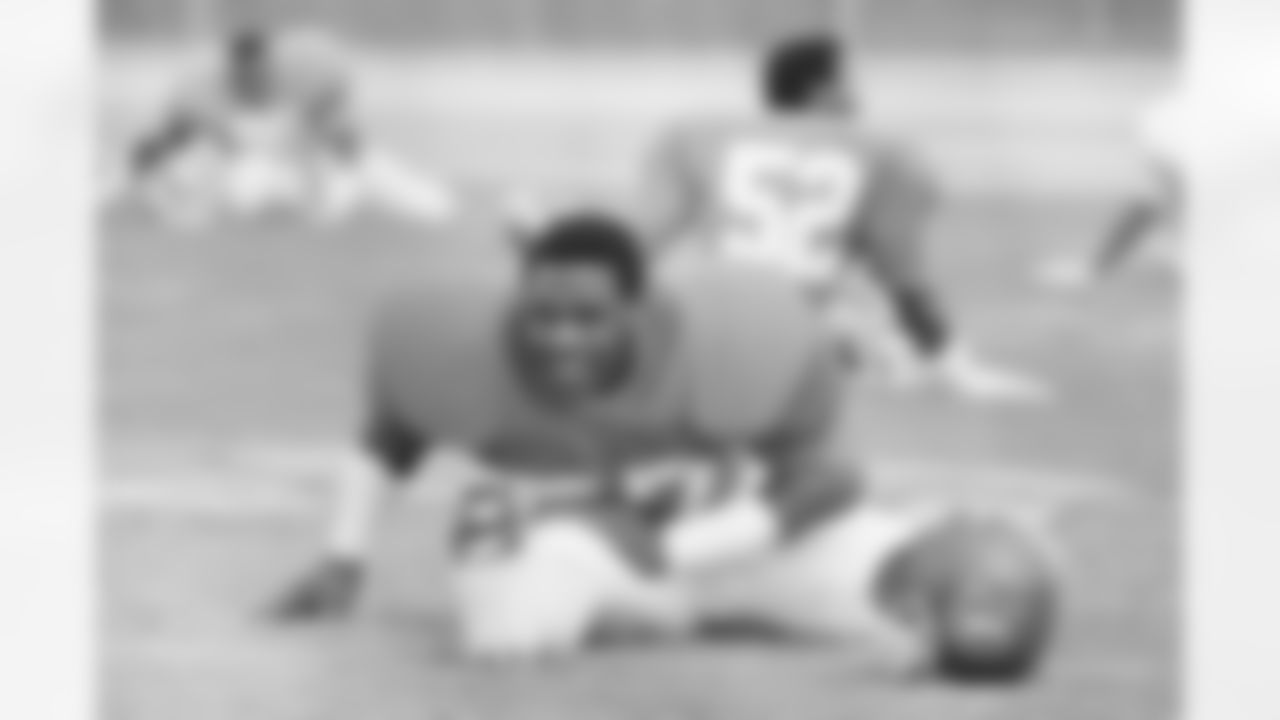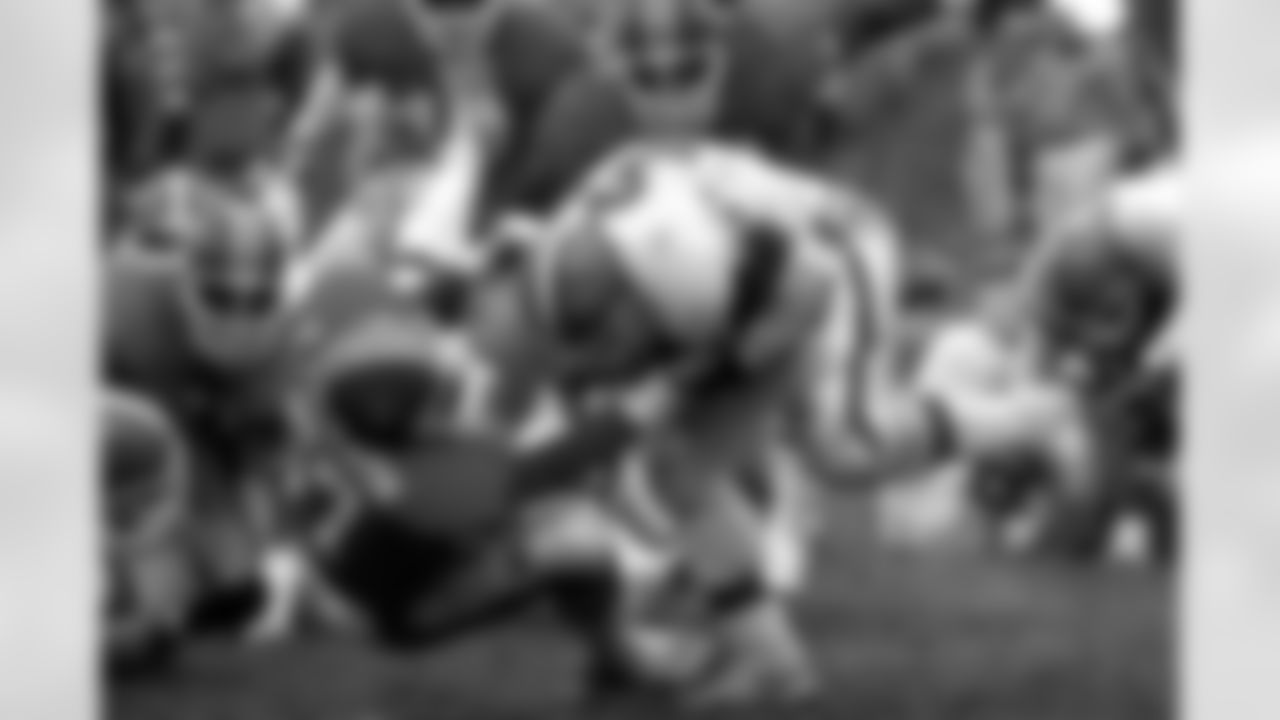In our Broncos Legends series, we're revisiting the careers of some of the best players in franchise history with video highlights and rarely seen photos — and they'll join us to break down their favorite moments as a Bronco and more. Here's a refresher on linebacker Tom Jackson's time in Denver.
Career overview
Before entering the NFL, Tom Jackson made his name as a linebacker at Louisville in the Missouri Valley Conference; larger programs had considered him undersized for his position, but his talent proved them wrong. He was selected twice as the conference's player of the year and led the Cardinals in tackles in each of his three seasons.
When the Broncos selected him in the fourth round of the 1973 NFL Draft, the Cleveland native who had grown up watching Jim Brown lead his hometown team to championship games suddenly found himself on one of the most unsuccessful NFL franchises. To that point, the team had never finished a season with a winning record.
"The big city boy," Jackson once said, "has gone to the woods now."
But Jackson would do more than his fair share to ensure that the Broncos could change their reputation forever.
In his first season, Denver secured its first winning season, and then added a second in 1974 as Jackson became a full-time starter. Two seasons later, as the Broncos had their most successful season yet, Jackson broke out — he intercepted seven passes, had four sacks, two fumble recoveries and one defensive touchdown. Still, national recognition would have to wait.
He wouldn't have to wait long, though, as the Broncos, led by new head coach Red Miller, stunned the league in 1977 with a 12-2 season. The team's success was largely due to the performance of the stingy, ruthless defense known as the "Orange Crush." As the team romped to Super Bowl XII in its first postseason berth, Jackson tallied four interceptions, four sacks and a defensive touchdown. Individual accolades followed, as Jackson was selected to the Pro Bowl and earned first-team All-Pro honors from the Associated Press, the Pro Football Writers Association and Pro Football Weekly.
Jackson added two more Pro Bowls in 1978 and '79, and over his 14 years as a Bronco, he created a legacy unlike another other Bronco. Selected as the team's most-inspirational player in six consecutive years, Jackson was more than just a great player — he was also a great leader.
By the end of his career, Jackson had played in a franchise-record 191 regular-season games and 10 postseason games, including Super Bowl XXI, which was his final game.
"It's a tough decision, but rationally I know I'm making the right choice," he said at the time. "You would always like to go out on top, and I figure I'm going out one from the top, which is close."
After retiring from the NFL, Jackson embarked on a career in television that proved as successful as his previous one. He joined a fledgling sports network called ESPN in 1987 as the channel's first NFL studio analyst and remained there until 2016 alongside fellow longtime broadcaster Chris Berman. In 2015, the Pro Football Hall of Fame honored Jackson with the Pete Rozelle Radio-Television Award in recognition of his outstanding contributions covering the game.
Career accolades
Ring of Fame inductee (1992), Broncos 50th Anniversary Team first-team selection, Broncos Top 100 Team selection, two AFC championships, three Pro Bowls, one AP first-team All-Pro selection (1977), two second-team All-Pro selections (AP, 1978; Newspaper Enterprise Association, 1979), three team defensive MVP selections (1974, '76, '77)
Stats to know
Career stats: 191 games, 177 starts, 44 sacks, 20 interceptions, three defensive touchdowns, two forced fumbles, eight fumble recoveries
In his own words
"I like to think that I put everything I had into not only the way I played, but the way I practiced. I was one of those people who lived by the adage that you're going to play the way you practice. So I practiced really hard. And I took a lot of pride in getting my teammates to play their best. I don't pay a lot of attention to awards, but when the Denver Broncos started to hand out the most-inspirational award on a yearly basis, and I think for a number of years I won it every year — that one means something to me, because that was given by my teammates. I really am proud of that, probably most proud of that. We had some great accomplishments, and it's great to take advantage of that, go to the Super Bowls and all of that stuff, Pro Bowls, but the relationship with my team and my teammates was probably the most important thing to me.
"[I] started out at middle linebacker, because I played middle in college, and I started out inside for the Broncos. I liked to think that I was good against the run, even though I was undersized; I could rush the passer; and I also tell people I was running a 4.45[-second 40-yard dash], so I was able to be pretty good in coverage as well. That ability to stay on the field every down, which now it doesn't happen as much in the league, where you have a guy, a linebacker, who just stays on the field every down. And that's what I wanted to do. Probably one of the best decisions that was ever made for me was made by Joe Collier, our great defensive coordinator, and Joe called me in after my first year. He had me playing middle linebacker, and then he called me in just before the next season started, my second year, and he goes, 'Tom, I've been thinking about it, and at under 220 pounds … I just don't think that your body is going to stand up to the punishment of playing in the interior linebacker slot, so I'm going to move you to the weak side. And I'm going to move you to the open side of the offense where you can use your speed, you can use your skills to rush the passer. You're going to be blocked by, at times, running backs. We want to be able to take advantage of that.' And what he didn't know at the time was I was just so happy, because I was getting beat up so bad on the inside on the interior."
Three games to remember
Week 10, 1976 season: Broncos 17, Chargers 0
This game may have been Jackson at his most active. Just before the end of the first half, Jackson snagged his first interception, but in the fourth quarter, he really turned it on. The quarter began with Jackson recovering a fumble at the 2-yard line as the Broncos held onto a 10-point lead. On the next drive, he sacked Dan Fouts and was credited with the coverage on the incomplete pass on third down. Later, with less than two minutes left, Jackson added the coup de grace, securing his second interception. This time, he returned it for a touchdown.
Week 5, 1977 season: Broncos 30, Raiders 7
This game's importance for Jackson had little to do about individual accomplishments. Rather, it was all about the milestone of beating the Raiders, who were the defending champions and who had lost to the Broncos just twice in the previous 28 games.
"Finally overcoming the jinx of the Oakland Raiders and beating them in Oakland by such a huge margin, I believe by about 30-7, was something we needed to do, we had to do, and that was a huge moment for us," Jackson says. "Everybody expected us to lose and we beat them in a blowout. That was the game — and I respect John Madden, but that's the game where I rolled up on the sideline and Coach Madden happened to be standing there. And I'm not all that proud of it, but it's just something that came out, and I said, 'How do you like that, fat man?' And he laughed it off later on, as well, and we got to know [one another], but it was a great moment for us where we realized, finally, 'OK, that proves we're ready to compete.'"
1977 Divisional Round: Broncos 34, Steelers 21
In the Broncos' first-ever playoff game, they faced a franchise that was of a much different caliber. The Steelers had won back-to-back Super Bowls in 1974 and '75, and they would do so again beginning in 1978. But on this day against the Broncos, they couldn't outmatch Denver's defense to keep pace in the fourth quarter. Jackson played perhaps the biggest role in that, as he picked off Hall of Famer Terry Bradshaw twice in the final period and set up two Broncos scoring drives.
Flip through photos from Tom Jackson's Ring of Fame career.

Denver Broncos linebacker Tom Jackson (57) runs in pursuit during an NFL game against the Kansas City Chiefs in Denver, Nov. 16, 1986. The Broncos defeated the Chiefs 38-17. (AP Photo/Eric Lars Bakke)

Denver Broncos linebacker Tom Jackson (57) lines up to pass rush during an NFL game against the Dallas Cowboys in Denver, Oct. 5, 1986. The Broncos defeated the Cowboys 29-14. (AP Photo/Eric Lars Bakke)

Minnesota Vikings wide receiver Ahmad Rashad (28) is wrapped up by the Denver Broncos defender Tom Jackson (57) after Rashad pulled in a pass from his quarterback during first half action in their game at Denver's Mile High Stadium, Nov. 2, 1981. (AP Photo)

Denver Broncos linebacker Tom Jackson (57) smiles while stretching in preparation for a workout, Jan 22, 1987, Irvine, Calif. (AP Photo/Ed Andrieski)

Linebacker Tom Jackson indicates that the Broncos are No. 1 as he looks out from the Denver locker room towards the jubilant fans after the Broncos beat the Oakland Raiders in the AFC championship game in Denver, Jan. 2, 1978. (AP Photo)

Denver Broncos linebacker Tom Jackson (57) tackles Pittsburgh Steelers running back Rocky Bleier (20) during an NFL game circa 1978. (Tony Tomsic via AP)

Quarterback Dan Fouts of the San Diego Chargers is wrapped up by linebacker Tom Jackson (57) of the Denver for a sack during a game at Mile High Stadium in Denver, Colo., Sept. 27, 1981. (AP Photo/Ed Andrieski)

Denver Broncos linebacker (57) Tom Jackson sets for play at Super Bowl XXI at the Rose Bowl in Pasadena, California. (Al Messerschmidt via AP)

Denver Broncos linebacker Tom Jackson (57) is seen in action during Super Bowl XII, Sunday, Jan. 15, 1978, at the Louisiana Superdome in New Orleans. The Dallas Cowboys defeated the Denver Broncos 27–10. (Tony Tomsic via AP)

Linebacker Tom Jackson plays defense during a game at Mile High Stadium.

Denver Broncos linebacker Tom Jackson (57) pursues a Browns ballcarrier during a 23-20 overtime victory over the Cleveland Browns in the 1986 AFC Championship Game on January 11, 1987 at Cleveland Municipal Stadium in Cleveland, Ohio. (AP Photo / Al Messerschmidt)

Linebacker Tom Jackson tackles a Browns ballcarrier during the January 11, 1987 AFC Championship overtime win (23-20) at Cleveland.

Denver Broncos linebacker Tom Jackson (57) and safety Bill Thompson (36) congratulate a teammate during the 1977 AFC Championship game against the Oakland Raiders on January 1,1978. The Broncos defeated the Raiders 20-17. (Peter Read Miller via AP)

Linebacker Tom Jackson, defensive back Steve Foley, owner Pat Bowlen, quarterback John Elway and other members of the Broncos make a toast with Orange Crush soda.

Linebacker Tom Jackson lines up for a play during a game at Mile High Stadium.

Linebacker Tom Jackson celebrates his first career touchdown during a snowy game at Mile High Stadium.

Linebacker Tom Jackson lines up for a play during a game at Mile High Stadium.

Linebacker Tom Jackson is congratulated by coaches on the bench during a game at Mile High Stadium.

Tom Jackson goes up to block a pass against the Rams.

Tom Jackson accepts a trophy from the Denver Broncos Quarterback Club.

Tom Jackson on the sidelines watches a play against the Chargers.

Tom Jackson tackles Buffalo Bills running back O.J. Simpson.

Tom Jackson on the sideline.

Tom Jackson chases Jets quarterback Matt Robinson.

Linebacker Tom Jackson walks to the line of scrimmage during a September 1982 game.

Linebacker Tom Jackson leaps to block a pass from Cowboys quarterback Danny White during a game in Dallas.

Tom Jackson, Dan Dierdorff, and Billy Thompson share a laugh before the Broncos game against the New England Patriots at Mile High Stadium in Denver, CO on October 6, 1997.

Former Denver Broncos player and ESPN analyst Tom Jackson covering the Denver Broncos' training camp at Dove Valley in Englewood, CO. on July 26, 2012.

Former Denver Broncos from left to right; Tom Jackson, Floyd Little and Billy Thompson at the Mizel Institute's 2013 Community Enrichment Award night May 22, 2013 where Broncos Owner and CEO Pat Bowlen received the award in front of more than 2,000 guests, including Broncos Hall of Famers.

Executive Vice President of Football Operations/ General Manager John Elway on air with ESPN sportscasters Tom Jackson, Adam Schefter and Jay Harris at Denver Broncos training camp on July 31, 2015 at the UCHealth Training Center in Englewood,CO.

Ring of Fame former linebacker Tom Jackson looks up at banners of other Ring of Famers after a walkthrough practice in Pat Bowlen Fieldhouse as part of Ring of Fame weekend on November 18, 2017. (Ben Swanson)














